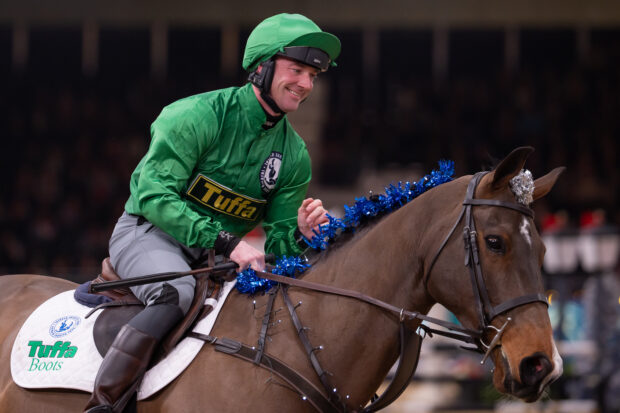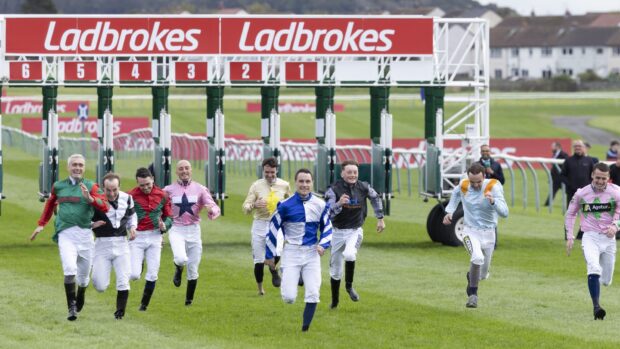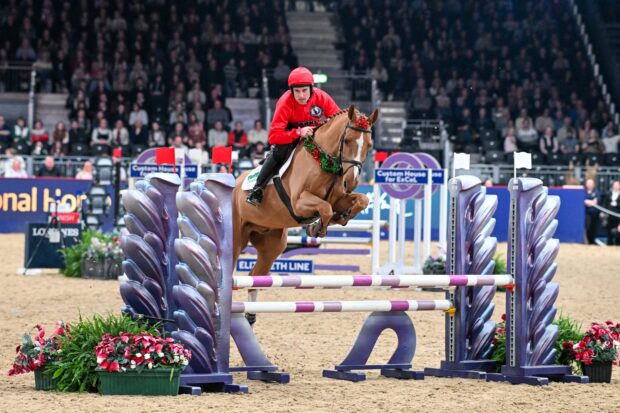Flat jockey Connor Beasley was picked by Channel 4 Racing's Mick Fitzgerald as "the brightest young jockey in the country" in 2013. But a horror fall in 2015 left him with a serious head injury and a long road of rehabilitation ahead
Flat jockey Connor Beasley hails from Spennymoor, County Durham. As a young lad he went up through Pony Club, enjoyed some showjumping and pony racing, rode in point-to-points and hunted with the South Durham, whipping in and helping with the hounds.
Connor began riding out at fourteen in his school holidays: “My mother was working for Richard Guest so I used to tag along.”
“My grandfather [Bobby Beasley] was assistant trainer to Arthur Stephenson. He knew the racing trade as does my mother and father [both work riders] — you could say it was bred into me.”
At sixteen, Connor left school. He dreamt of being a farrier, but didn’t have the grades to get into college, so took a full-time post with trainer Tracey Waggott.
At the start of 2012, he teamed up with trainer Michael Dods at Denton Hall, near Piercebridge.
“I wanted to learn more about racing and they offered to get me my apprentice licence — things snowballed from there.”
Connor was granted his apprentice riding licence in July 2012, and rode his first winner at Ayr two months later. Clocking up multiple winners, Mick Fitzgerald picked Connor out on Channel 4 Racing as the brightest young jockey in the country the following year.
By the summer of 2015, and at the age of 21, Connor was enjoying his first full season as a professional jockey with 29 winners already under his belt. He’d finished the previous year with 61 winners to his name, and was feeling positive about the future.
On 7 July, Connor was piloting Bryan Smart-trained Cumbrianna round the 6f handicap sprint at Wolverhampton.
“I can’t remember a great deal about the accident, but I am told my horse clipped the heels of the one in front, broke the top of her leg and fired me into the pack where I got trampled.”
The accident proved fatal for the filly, and Connor, having sustained a serious head injury, was airlifted to the neurological unit at Royal Stoke University Hospital after regaining consciousness.
Connor was admitted with multiple injuries including a fractured skull and spine, a bleed on the brain and a damaged neck where he was kicked by the Martin Dwyer-ridden Bilash.
He underwent a ten-hour operation to repair his skull. Six plates were inserted into the left hand side of his head to repair the fracture and he also had plastic surgery to repair the damage to his ear.
Following surgery, Connor would remain in intensive care for the next four days and a full neck and back brace would hold the upper half of his body upright for the next three months.
Connor’s mother Sue, and his fiancée [now wife] Carla travelled from Newfield to Stoke to be by Connor’s side. The IJF organised their hotel, so they could stay nearby for the duration of his hospital stay.
“The IJF were there from the word go,” says Connor.
After 12 days the hospital wanted to transfer Connor to the James Cook in Middlesbrough. However Connor had other ideas: “I was fairly headstrong and determined I was going home,” he says.
The hospital relented and Connor went back to home comforts. However, being in the acute stage of recovery from a head and spinal injury, he struggled to do anything for himself.
“I couldn’t even put my own socks on,” remembers Connor. “My wife was basically my babysitter.”
During this time, his almoner at the IJF, Karen Sharpe, visited him once a week to offer support to both Connor and his family.
Connor also had his teeth, which had been broken in the accident, treated at a private clinic in Durham. The IJF paid for this dental work.
After three months, Connor was able to take the back and neck brace off and he started his rehabilitation at the IJF’s Jack Berry House in Malton. Initially only going a couple of times a week, by February he was “hitting it hard” and going four times a week to be put through his paces.
His rehabilitation programme consisted of strength and conditioning work, exercise in the hydro pool as well as physiotherapy on his neck and back.
“I felt as though I was achieving something every day I was there – it really helped my mind,” he says.
Connor’s dedication to his rehabilitation and the support of his friends, family, the IJF and the racing community meant that he was able to return to riding on 26 March 2016 – just eight months after his horror fall. A month later, he rode his first winner, Smart-trained Alpha Delphini, to victory at Musselburgh.
“It’s exciting to be back,” he says. “I’m riding out everywhere I can, trying to get my old contacts back and new ones along the way.”
“I still to this day can’t thank the IJF enough. If it wasn’t for them I wouldn’t be back as quickly as I am. They’re like family — if you need help or advice you can just give them a ring. It’s really good thing.”
And the IJF are just that. Karen also goes to see Connor’s grandfather Bobby Beasley once a fortnight.
“They are really helpful towards my grandfather, says Connor. “They take him out racing so he can see his old pals. On Cheltenham Gold Cup day, he went to lunch at Jack Berry House and saw other old jockeys and friends.”
“They can’t do enough for him never mind me.”



